The safety of St Jude’s students, staff and visitors is in good hands.
For almost five years Andrew Hives, or ‘Sarge’ as he is affectionately known in St Jude’s circles, has coordinated Emergency Response Plans for all campuses and teaches evacuation education to students during annual visits to the school.
The Australian police officer said it was vital to bring St Jude’s into line with emergency management plans used in all Western schools, and said ‘Little Sarge’ has been on-hand to ensure that goal is achieved.
Little Sarge, a puppet with a wealth of safety knowledge, has helped Sarge get the message across in his classroom lessons since 2012.
“Knowing what to do in the case of an emergency is critical for the safety of all students, staff and visitors,” he said. “I started using Little Sarge in my evacuation training sessions with the Standard 1 classes and he proved to be an effective tool. The students got very involved with him. They remember the lessons because they remember Little Sarge.”
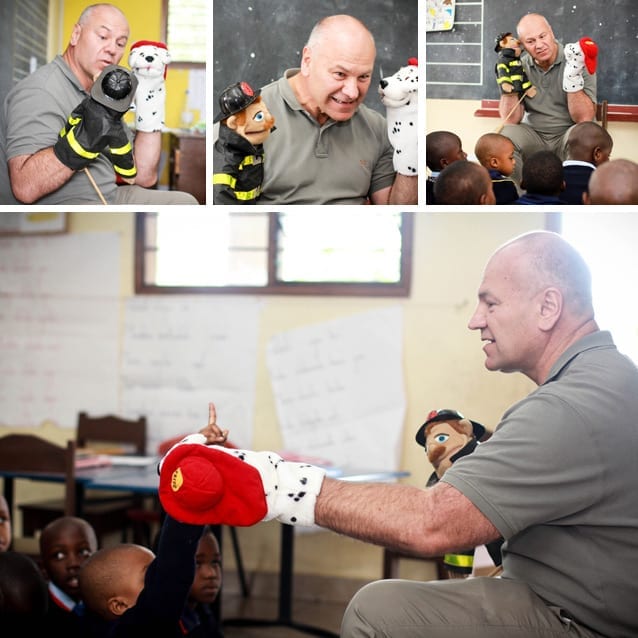
His newest addition, Fritz the Fire Dog, appeared in the line-up this year thanks to Cindy Skarbek, President of the American Friends of The School of St Jude board.
“I couldn't find Little Sarge when I came over this year and ‘Fritz’ (who was Cindy's son's childhood puppet) was brought over in case I couldn't find him,” the Senior Sergeant with Victoria Police and a Station Commander at Lilydale Police Station said.
“As it was, Little Sarge was found loitering in a brown paper bag on top of a cupboard in the Maintenance Office, which led to an increase in my puppetry repertoire!”
Sarge has also trained local staff member Reginald Mongi so that he can teach new students and staff members about evacuation policies between Sarge’s visits.
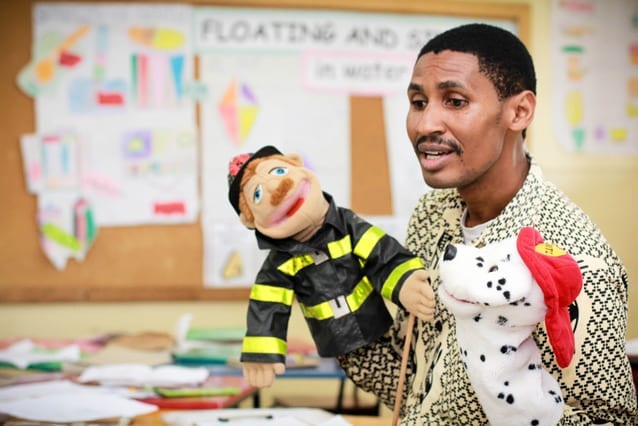
“I have known Reginald since I arrived in 2011, so it was a very easy to coach him through the instructional side of evacuation,” Sarge said.
“Reginald can also keep the teachers up to speed with things, as well as coordinate evacuation drills in my absence. He is also able to communicate with the new students in Swahili, which was always a tad difficult for me!”
We’re very thankful for our volunteers here at St Jude’s, and so fortunate to have people like Sarge return year after year to ensure everything is running smoothly.
In further efforts to get the message across, educational stickers have generously been provided by Lyndon Fire and Rescue in Louisville, Kentucky, Winston-Salem Fire Department, North Carolina and Country Fire Authority Victoria in Australia.
“The stickers promote good habits, regarding smoke in a room, the danger of fire, etc,” Sarge said. “They serve to reinforce the 'take-home' message for the students because they love stickers!”
We're launching a Short-Term Volunteer Program in January, 2016. Visit the school, see Tanzania's amazing wildlife and help our students. Find out more here.
Have you met Victor?
You should!
Victor is a master of languages; at age 8, he is top of Standard 1 (Grade 1) in English and Kiswahili. He is also number one in computer class and science!
Science is Victor’s favorite subject and when he grows up he wants to be a pilot.
Why? “So I can go to all the places I want to go to,” he said.
‘Captain Victor’ lives in Moivaro with his father, mother and younger brother Steven.
His parents, Adrian and Beatrice, have only a primary school education; both work six days a week to provide for the family and make sure Victor gets to school and has time to study.
Victor started at St Jude’s in January this year. Now that he is receiving a free, high-quality education, the family’s dream is to save enough money to buy a small piece of land, his mother, Beatrice, said.
Victor relishes being at St Jude’s; he’s a veritable ladies’ man, in the sense that all his best friends are girls. His favourite things to do are to speak English and, “play football, the monkey game and go on the slide at lunchtime.”
If you’d like to be dazzled by Victor’s school reports, correspond with the master linguist and even hang out with him and his family in person one day, why not become a sponsor?
Find out more about sponsoring a St Jude's student.
Louise Scott has been to many parts of the world, but there haven’t been many as memorable as The School of St Jude in Tanzania.
Her latest travels brought her from Australia, to Wimbledon and onto Africa with her partner George Spring and his daughter Isabella, and the group could not contain their surprise at what they found inside the school gates.
St Jude’s opened in 2002 with one volunteer teacher and three students. It now provides a free, high-quality education to almost 2000 of the region’s poorest yet brightest students, and this year celebrated its first graduating Form 6 class.
Visitors like Ms Scott, who hails from Bournemouth but has lived in Australia for the past seven years, can enjoy various activities and even stay overnight.
“From the minute we got on the bus to the moment we got off, (the students) sung songs to us the whole way,” she said.
“They were so happy, and singing about, you know, how they wanted to be a pilot through education, or a teacher through education, or a doctor through education.
“You look at kids in the Western world today, and then you see these kids who are happy, enthusiastic, and have amazing attitudes, and then you watch where they get off the bus… It’s confronting, and makes you realize how totally life-changing St Jude’s is to these kids. They have nothing, absolutely nothing, and they can come here and they’re going to get an education when they never would have had that opportunity in a million years otherwise, so it’s really great.”
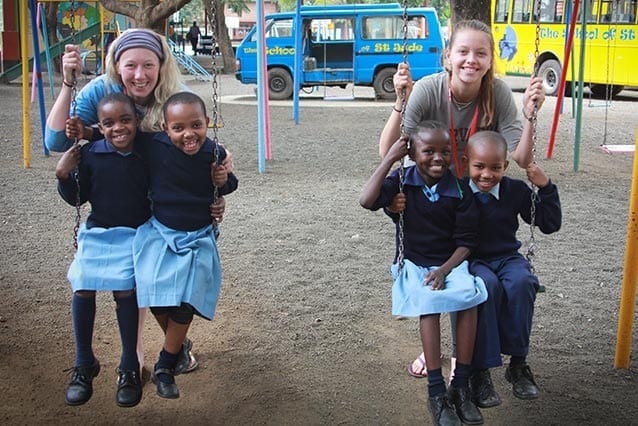
After climbing Mount Kilimanjaro, Louise and her group spent two nights at St Jude’s before she headed to a nearby town to volunteer at a farm. Louise said the school visit was particularly special as they had a chance to meet the student George’s parents sponsor.
“It was lovely to meet the kids, they were gorgeous. I don’t know if (George’s parents) will ever make it over to Tanzania, but for them just to know how their student is going will mean a lot,” she said with a smile.Ms Scott said visiting a developing country was particularly reassuring as they could see for themselves where donations were going.
“The wonderful thing about St Jude’s, from our perspective, is that you know your money is going to the children,” she said.
“You can come and see that this money’s going to the children.
“From the fact that they get fed three meals a day, which they probably wouldn’t get at home, they get an education and the teachers genuinely, really care about what they do. If you want to do something to put money into charity, doing it here means you know it is going to something that’s going to make a difference.”
Find out more about visiting our school. Review us on tripdvisor if you stayed overnight or visited our campus on a day trip.
Our students explored their cultural roots with boundless energy, making our sixth annual Cultural Day an event to remember.
Held at our Usa River campus, the colourful celebration featured a wide variety of Tanzanian music, dance, dress and food.
St Jude’s students represent 61 cultural tribes, with just over a quarter of those being Chagga. Many of our students also hail from the Maasai, Pare, Mwarusha, Msambaa and Meru tribes.
All these different cultures weave together to create a peaceful, vibrant and diverse country, where the population considers itself Tanzanian first and foremost.
For Cultural Day we spoke to Tanzanians from different backgrounds, so they could proudly share their roots with the whole St Jude’s family.
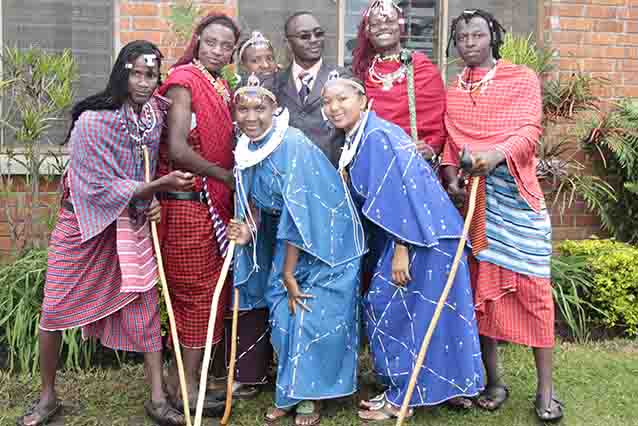
Area: Northern Tanzania and south-west of Kenya (the Maasai Mara National Reserve).
Lifestyle: The Maasai are semi-nomadic and raise livestock on seasonal rotation. According to the Maasai Association, women are responsible for constructing their houses, which are made of mud, sticks, cow dung and cow’s urine. Women also look after domestic duties, while male warriors are in charge of security.
The elders are directors and advisors for day-to-day activities.
Form 6 student and proud Maasai Godson (pictured above, second from the right) says “young boys look after the cattle and young girls who help their mums at home with domestic works”.
And how many wives can a Maasai man have? “Fortunately, or unfortunately, we do not have a limit. The limit is the sky,” Godson said. “You can marry as many women as you can, provided you have enough wealth to feed the family.”
Cuisine: “If you consider that we are nomads, meat is our first food, and then milk from the cattle.” Godson said. “We also drink blood. It’s to keep energy, and must be fresh. What we do is take it from the cow (elders know how to take it from a live cow), and apply cow dung to the wound to stop (bleeding).
We stir that blood, and sometimes we mix it with milk or take it alone. We do not keep that blood for later use. Some Maasai in town take vegetables but before we didn’t take it. Ladies took vegetables, but even today, men believe ‘how can I share grass with animals? If a cow eats grass, how can I eat grass?”
Dress: Age and location dictate clothing, although red is a favoured colour. Animal hides have generally been replaced with cotton cloth, with shukas (basic pieces of fabric wrapped around the body) commonly worn. Kangas (one-piece sarongs) are also common, as are body decorations such as jewellery and piercings.
Fast fact, and Godson’s favourite thing about being Maasai: “The fascinating thing about being a Maasai is that we are exposed to the environments where we become brave. For example, I am now a Moran, a Maasai youth warrior, whose main duty is to look after the tribe. Our duty is to look after the security of the tribe.
To do this, we have to be brought up in an environment where we become brave. One of the things we used to do was fight lions. You had to do it with a spear and a bush knife, and no-one would come rescue you. We believe the lion is the beast of the forest, so if you are able to fight a lion, who else could scare you? No-one.
Today we do not fight lions because we have been educated enough on the conservation of environment and wildlife, and the importance of having them. It is fascinating now, that in places like Ngorongoro Crater, Maasai now live with lions. Today, we just have a positive attitude and self-confidence. Even if I’m not going to fight a lion, I know I’m still capable of taking care of my family, and being responsible for the security of my tribe. What made us able to kill a lion was not our physical fitness, but our mental attitude.”
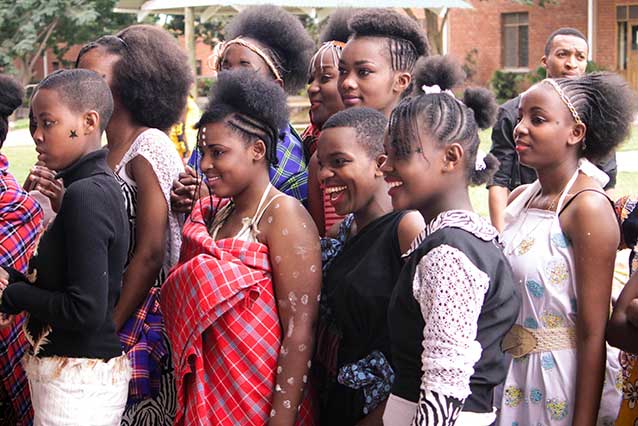
Area: On the slopes of Mt Kilimanjaro, says St Jude’s Form 1 student Nancy (pictured above, in centre wearing black). Households live amongst banana/plantain groves, with coffee plantations also popular.
Lifestyle: Traditionally, Chaggas work on their farms, with jobs divided by gender – men feed goats, build houses and prepare fields, while women look after domestic duties and are in charge of trading in the marketplace.
Cuisine: Nancy says a large part of the Chagga diet is bananas and plantains, or ‘ndizi’, as well as a little milk. Their staple crop is millet.
Dress: According to Nancy, Chaggas traditionally wear a specific type of kanga (cloths that are wrapped around the body), known as a ‘kaniki’. They can only be black and/or white (like the one she wore during Cultural Day).
Fast fact: They have a reputation for being good businesspeople. Encyclopaedia Britannica describes them as “one of the wealthiest and most highly organized of Tanzanian peoples”. One such example is Michael Shirima, founder and owner of Precision Air, Tanzania’s largest privately-owned airline.
Nancy’s favourite thing about being a Chagga: “I’m proud of being a Chagga because they’re from around Mt Kilimanjaro. The food is also really nice.”
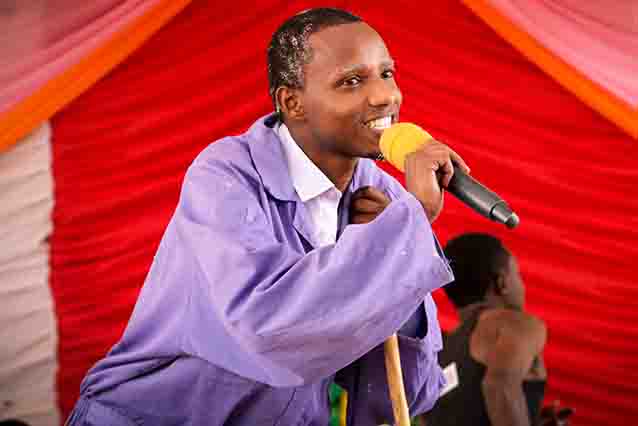
Area: North-eastern Tanzania, in the Arusha and Manyara regions.
Lifestyle: Emmanuel (pictured), who is a teacher at St Jude’s, said the Iraqw raise livestock, hunt and cultivate. “We live in parts of the mountain, we like the cool places,” he explains. “We also have traditional dance, almost like Maasai, but ours is a bit different. We jump and we have spears.”
Cuisine: According to Emmanuel, their traditional food is ‘makande’ (maize cooked with beans or meat).
Dress: Shukas (basic pieces of fabric wrapped around the body), like the Maasai.
Fast fact: The Iraqw language is greatly influenced by Hebrew and Arabic, as the people originally came from an area in Ethiopia near Somalia.
Emmanuel’s favourite thing about being Iraqw: “Our language, our wearing style, and, above all, we are known for having girls who are very beautiful. They have nice hair – wavy and smooth.”
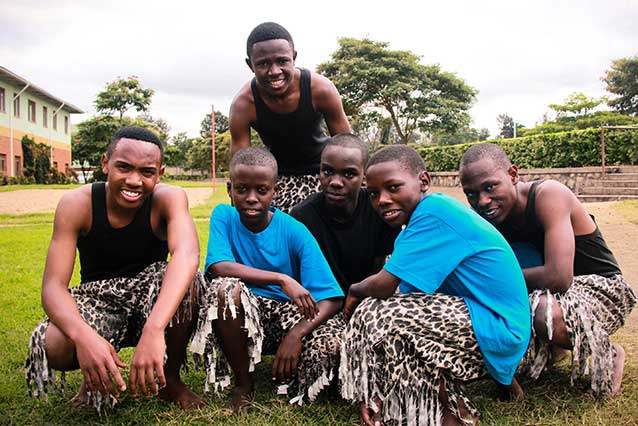
Area: Central Tanzania, in the Dodoma region.
Lifestyle: People from the Gogo tribe typically raise livestock, according to St Jude’s Form 5 student Simon (pictured above, far right). He said it is quite common to have larger families, and other Gogos are often surprised he is only one of three children.
Cuisine: Simon says ugali, a common Tanzanian food, is a staple. However, the Gogo make their version from wheat, instead of the traditional maize flour, millet flour, or Sorghum flour. “It means ‘power’,” Simon says. “The wheat means power. If someone takes it they get courageous”.
Dress: (Modern) dress includes trousers and a Maasai shuka (a basic piece of fabric that can be worn a variety of ways). Women wear loose-fitting dresses made of solid or printed cotton fabric.
Fast fact: They are “very good singers,” according to Simon. Examples include popular Tanzanian singer Ben Paul and traditional singer Hukwe Zawose.
Help us continue to educate and empower our students through events like Cultural Day by making a donation to our school.
A FEW years ago, Kim Saville was working in a high-profile job in film and television casting, finding future stars for shows including Water Rats and Murder Call.
These days you will find her in the foothills of Mt Kilimanjaro,
surrounded by smiling, bright-eyed Tanzanian children from The School of
St Jude.
It’s a dramatic lifestyle change, but one which the former Sydneysider finds extremely rewarding.
For 13 years we have been working towards this day - the day we commemorate our first Form 6 graduates leaving behind their school teachers, school books and school uniforms and heading into the world beyond the school gates. These proud young men and women will celebrate their graduation on Saturday, May 30, 2015, with their parents, school staff members and supporters from around the world who have shared the school’s long-term vision of fighting poverty through education.
As well as a stirring and emotional tribute to our 61 graduates on that Saturday, the students and staff have also planned fun, informative and creative events in which visitors may participate during the week leading up to the big day! Everyone, no matter where you are, is guaranteed a St Jude’s experience to remember!
If you're interested in coming to St Jude's to celebrate with our students, it’s not too late.
If you can’t join us in person don’t worry, you can still be a part of it!
Keep an eye on our website and social media as we keep you up to date with videos and photos throughout the graduation week!
Want to get involved? Our first ever Form 6 Graduation is a great reason to spread the word about St Jude’s and how we are fighting poverty through education. Why not host an event or small gathering and share the graduation video with your family, friends and colleagues. The video will be released soon after graduation. Find resources and ideas here to get you started.
Want a bit of a peek behind the scenes of the graduation planning?!
We’ll let Kudra and Enock, the Form 6 students on our graduation committee, give away a few secrets:
What role are you playing in planning the graduation?
KUDRA: I am the class representative member of the committee. I am bridging the gap between the graduates and the school’s graduation committee. I was elected to be a class representative by my fellow students.
ENOCK: The committee realised early on that we had some creative ideas to make the graduation awesome, so we were given a chance to be part of the organisation team.
What ideas are you working on now?
KUDRA: Some of the decisions that still need to be made are: planning for the night concert after graduation, picking the guest of honour, putting together gifts and preparing our farewell presentation.
What are you most excited about?
ENOCK: I am most excited to see the sponsors! I am also very excited to graduate A-level, it has been two busy years of hard work and sacrifice. I also can’t wait for Day 3 - the fun day where we will enjoy the variety of sports and games with staff, fellow students, visitors and sponsors. I hope it will be awesome!
KUDRA: I’m excited about the day my classmates and I will spend helping at a children’s centre in Arusha, doing different charitable activities like washing their clothes, cleaning the environment and playing different games.
What are your plans after graduation?
KUDRA: After graduation I will do my community service year in two sessions: Outside St Jude’s, I will teach commerce, accounting, bookkeeping and Kiswahili at Arusha Secondary School. At St Jude’s, I would love to serve as a boarding matron at the Moivaro campus.
ENOCK: I will take a month to rest and plan for my community service program. I will also use this time to explore tertiary education and be with my family.
What do you think graduation will be like?
KUDRA: I hope it will make a remarkable day at St Jude’s. Many people will come over including sponsors, donors, volunteers and parents to join us celebrating our achievement.
ENOCK: I know it will be a remarkable one. First one in history. Having all the well-wishers around will be just incredible.